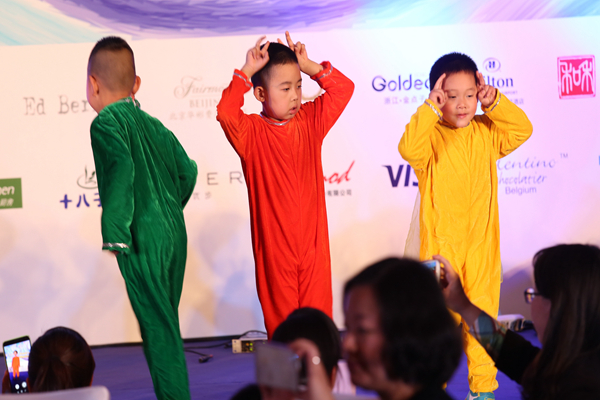 |
|
Children at Beijing Stars and Rain Education Institute for Autism stage a performance during a charity banquet in Beijing on Saturday. [Photo/China Daily] |
Now 12, she is too old to receive further care at the rehab center, as it only caters to children aged 3 to 6. Like many parents in her position, Li had to give up work to care full time for her autistic child.
The 39-year-old mother said her biggest worry now is "how will she survive after my husband and I pass away?" It is a common concern among parents in her situation, especially those with teenage or adult children.
"I know an elderly couple who have a 35-year-old autistic son. He is tall and strong, and often displayed aggressive behavior," said Kuang Guifang, an expert in autism and director of psychology at Qingdao Children's Hospital in Shandong province. "They are too old to control him and are always being injured as a result.
"They tie him to the bed for fear that one day he may set the house on fire or seriously hurt someone."
Support network
Health experts estimate at least one parent in about 95 percent of families affected by autism will need to leave work to care for their child. Meanwhile, the cost of rehab training can often account for 60 to 80 percent of a household's income.
In most cases, the support available from Chinese authorities and charities to families affected by autistism is falling short. Parents tend to rely on informal support networks that develop within their communities.
Meng Fanyu, a single mother, is one example. She gave up her hairdressing business to care for her 7-year-old son after his diagnosis and, since then, has had no steady income. Paying for treatment has drained most of her savings, and that of her parents.
To make ends meet, she started working as a carer at the rehab center in Shandong province where he son receives training. Her job is financed in part by other parents who use the center.
Many parents have taken a similar path. In fact, most of the teachers, organizers and fundraisers at China's early rehab centers were relatives of autistic people, and they continue to make up a large proportion of applicants to teacher training programs run by Beijing Stars and Rain Education Institute for Autism.
"The reality is, being a special education teacher, such as at an autistic rehab center, does not command a high salary," said Sun Zhongkai, the institute's executive director. "People don't usually stay in the job for long unless there's a reason. That usually comes down to their personal experience."
Stars and Rain, arguably China's most well-known autistic support center, was founded almost single-handedly by Tian Huiping, who in the late 1980s returned from a scholar exchange program in then West Germany to be told by kindergarten teachers that they had noticed her 1-year-old son was failing to respond to people and things around him. After numerous hospital visits over the next three years, she finally heard the word "autism".
"Had Tian's son been diagnosed earlier he could have made better progress. Intervention is most effective for the children under 3," Sun said.
